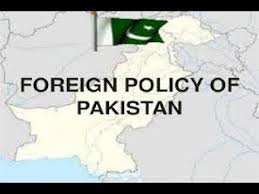Our Foreign Policy Imperative
We need more stable balanced foreign policy building a strong economy through broad based industrialisation and manufacturing growth

Pakistan’s foreign policy and the color chameleon in the jungle have one thing in common - both can change at a moment’s notice. Throughout our 75 year history, each new government brings with it a different alignment to the foreign policy of the state. This is not to say that the national interests of a country are always fixed and cannot change but extreme shifts in foreign policy objectives with every change of government are a hallmark of an unstable and shallow understanding of what the national interest is.
This can lead to serious security and economic repercussions of both positive and negative nature for a nation. Pakistan is one of the prime examples of how our ineffective and misaligned relations with other countries have led to a great deal of economic, social and security issues for our country and its people. From the Non-Aligned stance adopted during the early fifties to the pro western security alliance stance of the Ayub era, we have many examples of how each successive administration in Pakistan has simply jumped ships from one policy to another.
Latest example of our unpredictable foreign policy is our response to the
ongoing Ukraine crisis. At a time when most if not all of the international
powers that matter are pitching up against Russia, our PM flew off to Moscow
the same day Russia invaded Ukraine. In parallel, our unusually vocal attempts
to win support for the Taliban government are not going well with the western
world and highlight confusion among our foreign policy zealots as to where to
put their weight behind in the tussle among the heavyweights of the global
politics.
On the other hand, in the absence of organic industrial growth, mere
inflow of dollars was unable to support economic well being of a rapidly
growing population especially as most of it was being utilized for the benefit
of few and the mighty institutions, individuals and interest groups rather than
for the good of common people.
On the economic front, governments of Bhutto and Zia focused on sending its citizens abroad to the Gulf as well as Western countries in order to ensure a steady flow of dollars. In nutshell, Pakistan’s security policy has been revolving around nuclear deterrence and strategic depth, economic policy around foreign remittances and economic aid/loans.
The results of these pillars of foreign policy have been both positive as well as negative with later exceeding the former. Even though remittances have increased many folds thus improving the livelihood of millions of Pakistanis, it has reduced our focus on industrial development, export growth and higher import substitution. Rather than becoming a manufacturing powerhouse like South Korea and Japan, we have become an exporter of manpower where a vast majority of locals have no hope for a better future unless they move abroad.
We suffer from a huge trade deficit due to our need to import almost all essential goods. As a result, we have to beg from IMF, China, Saudi Arabia, United States and anyone else who can spare us some loose change so to speak. It also means that our security is constantly under threat despite being a nuclear power. To please those who can provide us aid and loans we have had to sacrifice tens of thousands at the altar of the war in Afghanistan with terrorist groups, arms and drugs flowing freely into Pakistan wreaking havoc which all Pakistanis are well aware of since the past two decades.
Our society has been and continues to
be destroyed by terrorism and extremism due to our flawed foreign policy of acting
as mercenaries for one foreign power or another. We are also constantly engaged
in an arms race with India due to the belief that our security and existence is
under perpetual threat from it. This arms race is putting a huge drain on our
resources - one we cannot afford and perhaps not required as the credible
nuclear deterrence we now possess has ended any threat of a large scale
conflict and a conventional conflict is not something we can win in the first
place.
Muhammad Ragheeb
ragheeb40@gmail.com













Post a Comment